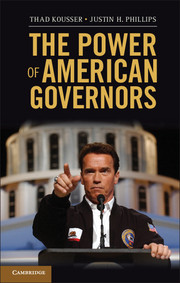Book contents
- Frontmatter
- Contents
- List of Figures
- List of Tables
- Acknowledgments
- 1 One Problem Shared by 50 Governors
- 2 The Roots of Executive Power
- 3 What Do Governors Propose?
- 4 Gubernatorial Success
- 5 Do Governors Set the Size of Government?
- 6 The Power and Perils of Popularity
- 7 The Item Veto A Negative or a Positive Power?
- 8 Legislative Professionalism and Gubernatorial Power
- 9 Governors and the Comparative Study of Chief Executives
- References
- Index
2 - The Roots of Executive Power
Published online by Cambridge University Press: 05 November 2012
- Frontmatter
- Contents
- List of Figures
- List of Tables
- Acknowledgments
- 1 One Problem Shared by 50 Governors
- 2 The Roots of Executive Power
- 3 What Do Governors Propose?
- 4 Gubernatorial Success
- 5 Do Governors Set the Size of Government?
- 6 The Power and Perils of Popularity
- 7 The Item Veto A Negative or a Positive Power?
- 8 Legislative Professionalism and Gubernatorial Power
- 9 Governors and the Comparative Study of Chief Executives
- References
- Index
Summary
During his eight years as New Mexico's governor, Gary Johnson competed in the Ironman Triathlon World Championship, won the America's Challenge Gas Balloon Race, played guitar with Van Halen's Sammy Hagar, and helped save a house when massive wildfires struck Los Alamos. Yet, one accomplishment that consistently eluded him was convincing legislators in Santa Fe to pass the items on his legislative agendas. Session after session, many of Gov. Johnson's policy proposals went nowhere. From the start of his administration, Johnson, a Republican with a background in business, openly clashed with a legislature led by Democratic political veterans. When he entered office in 1995, Johnson admitted, “I have no expectations to get anything out of the Legislature. The bottom line is we do have different philosophies.” The governor quickly highlighted these differences by vetoing a record-setting 200 bills passed by legislators, who retaliated by burying the bills that he wanted. By the end of that first year, Republican state senator Skip Vernon observed, “This guy couldn't pass Mother's Day through the Legislature.”
Little changed over the course of Johnson's governorship. The fate of the ambitious policy agenda that he announced in his 2001 State of the State address was emblematic of his frequent frustrations. He began his speech with a call for education vouchers that could be used in private schools. After Republican representative Dan Foley introduced the governor's proposal as HB84, the legislature wasted little time killing it.
- Type
- Chapter
- Information
- The Power of American GovernorsWinning on Budgets and Losing on Policy, pp. 26 - 73Publisher: Cambridge University PressPrint publication year: 2012



